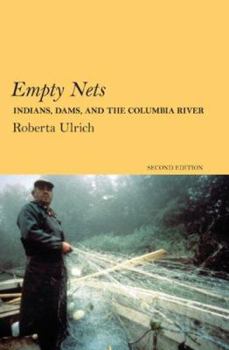Empty Nets: Indians, Dams, and the Columbia River (Culture and Environment in the Pacific West)
(Part of the Culture and Environment in the Pacific West Series)
Select Format
Select Condition 
Book Overview
Empty Nets is a disturbing history of broken promises and justice delayed. It chronicles a native people's fight to maintain their livelihood and culture in the face of an indifferent federal bureaucracy and hostile state governments. In 1939, the U.S. Government promised to provide Columbia River Indians with replacements for traditional fishing sites flooded in the backwater of the Bonneville Dam. Roberta Ulrich recounts the Indians' sixtyyear struggle, in the courts and on the river, to persuade the government to keep its promise. From the beginning, the battle was intertwined with the tribes' larger effort to assert treatyguaranteed fishing rights. Ulrich deftly examines a host of other issues--including declining salmon runs, industrial development, tribal selfgovernment, and recreation--that became enmeshed in the tribes' pursuit of justice. Her broad and incisive account ranges from descriptions of the dam's disastrous effec ts on a salmondependent culture to portraits of the plights of individual Indian families. Descendants of those to whom the promise was made and ac tivists who have s pent their lives working to acquire the sites reveal the remarkable patience and resilience of the Columbia River Indians. In a new epilogue, Ulrich updates the story of the treaty fishing sites-- now all nearly completed--and describes political and cultural developments since 1999, including a major new component: the planned reconstruc tion of the Celilo Indian Village. And yet des pite the everchanging circumstances surrounding the treaty sites, the tribes' objec tive remains the same. In the words of Donald Sampson, former executive direc tor of the Columbia River InterTribal Fish Commission, "Our people's desire is simple--to preserve the fish, to preserve our way of life, now and for future generations."
Format:Paperback
Language:English
ISBN:0870711881
ISBN13:9780870711886
Release Date:March 2007
Publisher:Oregon State University Press
Length:254 Pages
Weight:0.85 lbs.
Dimensions:0.6" x 6.1" x 8.9"
Customer Reviews
1 rating
Valuable facts about an essential story but in a repetitive narrative
Published by Thriftbooks.com User , 15 years ago
One of the more depressing features of American history is the remarkable diversity of ways in which Native American rights have been violated. This book tells the story of a sixty-year struggle to get in-lieu fishing sites on the Columbia River when the original fishing sites were flooded by dams. Everyone agreed that the Indians had a right to in-lieu sites, and eventually their allies included governors, senators and congressmen, and yet another twenty years passed before action resulted. Ulrich's story of how whites failed the river people provides an invaluable source for those interested in the topic. But it's a problematic read because 200 pages of bureaucratic stonewalling and procrastination don't make for a compelling narrative. All too often, the book becomes a litany of depressing facts more than a story. Ulrich's chronological organization, instead of building the history around themes, does not help her overcome this narrative weakness. The chronology just emphasizes the "more of the same" nature of the bureaucratic failings instead of strengthening either the drama or the analytics. The basic issues are straightforward enough. The Army Corps of Engineers built dams on the Columbia River. These dams these drowned traditional Indian fishing sites to which Indians had treaty rights. The US government agreed to provide alternative, "in lieu" sites. The Corps agreed in principle but didn't find it interesting in practice to build fishing sites. Politically, it was also more rewarding to build recreational sites for whites than in lieu sites for Indians. The Bureau of Indian Affairs was its usual incompetent self and did not move the in lieu sites forward. White fishermen had no interest in the rights of Indian fishers. There were conflicts with other users of the rivers, such as sailboarders, residential developers, and the railroads on each shore. So all the whites agreed that the Indians had a right to in lieu sites but nobody actually did anything to provide the sites. Meanwhile white overfishing and white dam building destroyed the salmon runs and reduced the number of fish on the river. So there you have it: a story that needs to be told, but I wish it had been told a little differently.






